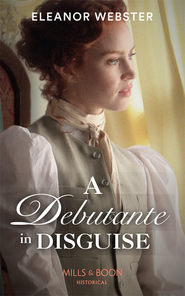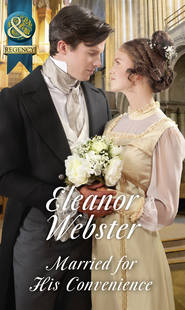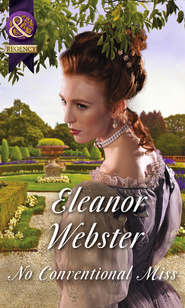По всем вопросам обращайтесь на: info@litportal.ru
(©) 2003-2024.
✖
Her Convenient Husband's Return
Настройки чтения
Размер шрифта
Высота строк
Поля
And she would tell him about Edmund.
In many ways, Edmund had been his only friend; they had shared a fascination with science. Granted, Edmund had been older and more interested in mechanised invention than seeds, but there had been similarities in their minds and intellects.
And now, she must tell him about Edmund’s death. Strange how someone remains alive until one is told otherwise. Edmund was still alive to Jamie and would remain alive until she told him he was not. In many ways it made her the executioner.
Beth stood, too restless to be contained within the easy chair. She paced the seven steps to the window. She thought of Ren. He and Edmund had been inseparable as children—although he had spent little enough time here since. Her heart hurt for him, but she also felt anger. Why had he turned so resolutely against Graham Hill? How had London’s lure become so strong for the boy she used to know?
She remembered the four of them scrambling across the countryside. Well, Jamie and Edmund would scramble. She would often sit while Ren painted. She’d hear the movement of his brush strokes across the canvas, mixed with myriad woodland sounds; water, birds, bees, leaves... And Ren would describe everything: puffy clouds resembling sheep before shearing, streams dancing with the tinkling of harpsichords and tiny snowdrops hidden under the bushes like shy maidens.
Yet now Ren was at the big house with a mother he did not like.
Alone.
He no longer painted. He no longer liked the country. If gossip was true, his life in London was dissolute.
‘Arnold said you needed to speak to me.’
She startled at Jamie’s voice, wheeling from the window.
‘Yes. I need to tell—’
‘I know about Edmund,’ he said.
‘You do?’ She exhaled, both relieved that she need not tell him and guilty that she had not been the one to do so.
‘Lady Graham’s maid told the whole staff. Should not have enlisted. Tried to talk sense into him.’
She heard the wheeze of cushioning as her brother threw himself heavily into his chair.
‘He never was the same after Mirabelle died,’ she said.
‘Still had the land.’
Beth permitted herself a sad half-smile. For Jamie, the land, the scientific pursuit of hardy crops and livestock would always be sufficient. There was an invulnerability about him that she envied.
‘So Ren is Lord Graham now,’ Jamie said.
‘Yes.’
He made a grumbling sound. ‘I hope he intends to take his responsibilities seriously. No more capering about. He’ll have to spend more time here.’
‘I guess—’ she said jerkily.
His words startled her. She had not thought of this and felt that quick mix of emotion too tangled to properly discern: a jumble of breathless disorientation; anticipation and apprehension.
‘He may not want to,’ she said.
‘Must. His responsibility now,’ Jamie said. ‘Wonder what he knows about seeds?’
‘Not much. London isn’t big on seeds.’ She gave a half-smile that felt more like a stifled sob.
‘Guess I could teach him.’
Beth nodded. The young boy she had known would have needed no convincing. He had loved the estate from its every aspect. He’d loved the tenants, the fields, the animals.
But the man—her husband—did not.
* * *
The morning of the memorial dawned clear. Beth could feel the sun’s warmth through the window pane. She was glad it was sunny. Edmund had liked the sun.
She’d visited Graham Hill the previous day, but neither Ren nor his mother had been available, so she had returned with the nebulous feeling that she ought to do something more.
That was the thing about this marriage: it had brought them no closer. There had been no return of their former friendship, no occasional visits, no notes from London, laughter or pleasant strolls.
With Mirabelle’s death, she’d taken on more duties on the Graham estate but with a confused uncertainty, unsure if she was a family member helping out or a neighbour overstepping.
Now she wondered if she should go to Graham Hill prior to the service? Or merely join Ren at the church? Likely he’d prefer to ignore her or have her sit like a stranger. But the tenants would not.
Fortunately, the arrival of a curt missive from Graham Hill settled this dilemma. Jamie read the abrupt note which stated only that the Graham carriage would collect them so that she could attend the service with her husband.
‘Indeed, that is only logical. It would be foolish to bring out both carriages to go to the same location,’ he concluded in his blunt sensible manner as though practicality was the only issue at stake.
Husband. It had been so much easier to cope with a husband when he remained unseen in London. Then she had been able to think of that quick ceremony as a dream or an episode from a past life with little impact on her present. Indeed, he had felt less absent miles away than now when she knew they were within half a mile of each other, shared a common grief, but were as remote as two islands separated by an ocean.
Of course, his instant removal the day of the marriage service had hurt. She remembered listening to the fast trot of his fashionable curricle down the drive at Allington with a confused mix of pain, relief, embarrassment.
But truthfully, relief had overshadowed all other emotion. Allington had not been sold. Her father’s gambling debt to the Duke had been paid. She was safe from Ayrebourne. Indeed, she’d not been in that unpleasant man’s presence since she had politely declined his proposal, although she still felt an uneasy prickle of goose pimples when she remembered that interview.
Even now, close to two years later, the tightness returned to her stomach whenever she remembered the day. The chill cold silence of the library had felt so absolute. She’d wished that she had ordered a fire lit. She’d felt so enclosed, so isolated alone with this man.
‘You have an answer for me?’ he’d asked, taking her hand in his.
His fingers had been cold—not a dry, crisp cold, but clammy.
She’d said the right things, the pretty phrases of refusal. Of course, she hadn’t been able to see his expression, but she’d felt his anger. His hand had tightened on her own, his fingers digging into her flesh so that for days after it had felt bruised.
‘You are refusing?’
‘Yes, with gratitude for—for the honour, of course.’
‘And this other suitor? He will be able to pay off your father’s debts. They are substantial.’
‘Yes,’ she’d said.
For a moment, Ayrebourne had made no reply. Then he’d leaned closer. She’d heard his movement, the rustle of his clothes and felt a slow, growing dread, as though time had been oddly slowed or elongated. With careful movements, he’d lifted his hand and touched her face with one single finger. ‘A shame.’
Nauseous distaste had risen, like bile, into her throat. Twisting fear had made her tongue dry and swell, becoming bulbous as if grown too big for her mouth.








